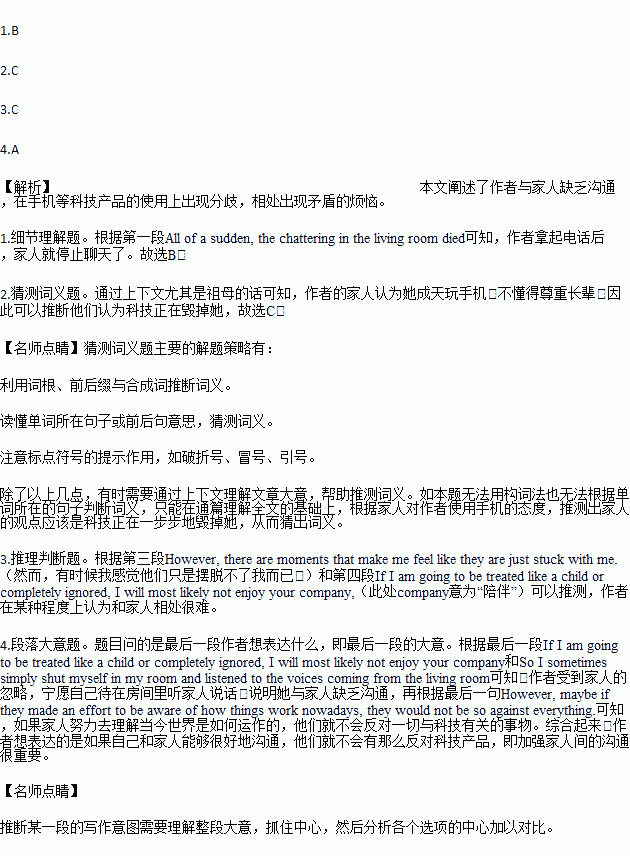题目内容
I could feel the judging eyes of my family burning a hole into the back of my head as I picked up my phone. All of a sudden, the chattering in the living room died and all I could hear was the sound of the turkey sizzling (发出嘶嘶声) in the oven.
“Look at her! She’s been on her phone all day long! It’s all your fault! Children will never respect elders if they are not taught how to behave! ” my grandmother shouted.
I was very shocked and angry! I opened my mouth to say something, but words failed me and I just sat down quietly on the chair like a mouse in its trap. I thought “Here we go again.” I truly love my family and I would do anything for them. I also know that they would do anything for me as well. However, there are moments that make me feel like they are just stuck with me. They all agree on one thing: technology is wrecking me.
If I am going to be treated like a child or completely ignored, I will most likely not enjoy your company, and I feel like this applies to (适用于) the majority of the people. So I sometimes simply shut myself in my room and listened to the voices coming from the living room, thinking: They all grew up in a world so different that it amazes me how they have actually gotten this far. They did not have phones or any type of advanced technology, which is both good and bad. Bad because they had almost no type of fast communication, and good because they were forced to interact (互动) with one another, which is something today’s society is lacking in. However, maybe if they made an effort to be aware of how things work nowadays, they would not be so against everything.
1.What happened when the author picked up her smart phone?
A. Her family laughed at her. B. Her family kept silent.
C. She felt like having headache. D. She smelt something burning.
2.The underlined word in the third paragraph probably means ________.
A. punishing B. encouraging
C. ruining D. saving
3.We can infer from the passage that the author felt it hard ________.
A. to do something to please her family
B. to satisfy her family’s high expectation
C. to get along with her family in some way
D.  to move out or break away from her family
to move out or break away from her family
4.The author uses the last paragraph to show that ________.
A. it is important to strengthen understanding among the family
B. it is necessary to treat each other well in the family
C. it is hard for the older people to accept the advanced technology
D. it is her duty to provide her family with a happier life in the future
 天天向上一本好卷系列答案
天天向上一本好卷系列答案 小学生10分钟应用题系列答案
小学生10分钟应用题系列答案

 He made much more money than the farmer
He made much more money than the farmer